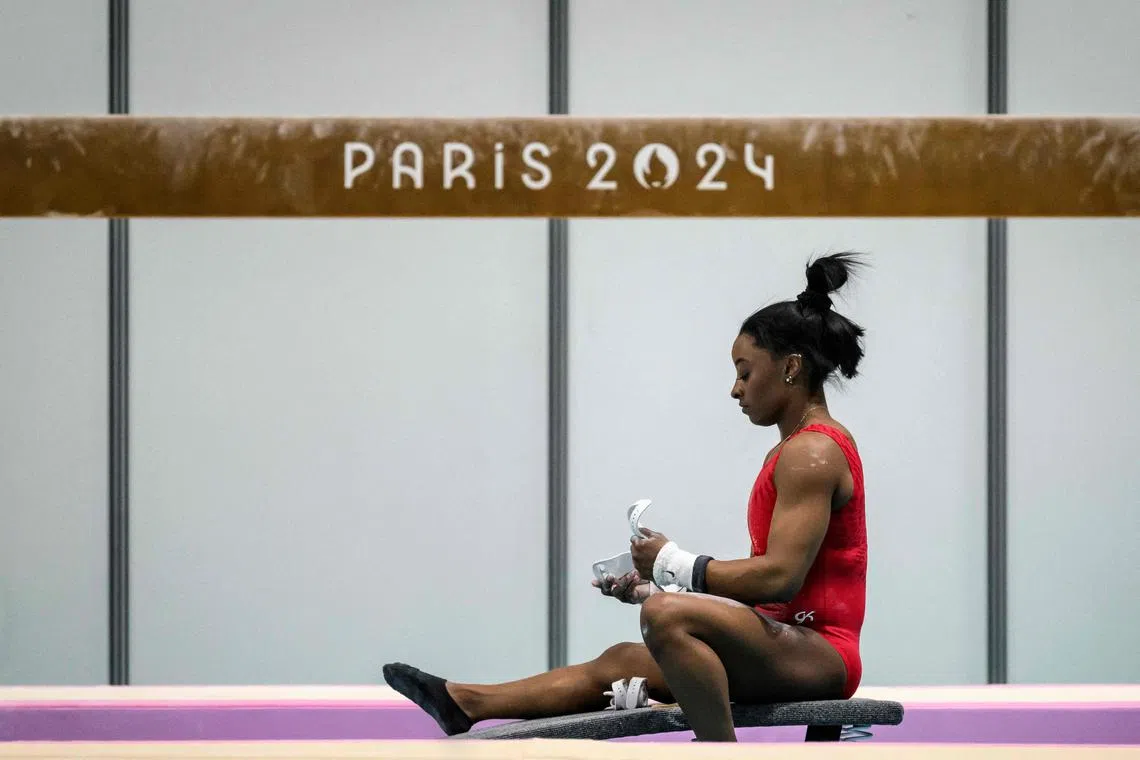As stigma fades, Paris Olympians prioritise mental health
Sign up now: Get the biggest sports news in your inbox

American gymnast Simone Biles had helped lift the mental health stigma at the Tokyo Olympics, a boon for competitors in all sports.
PHOTO: AFP
LOS ANGELES – Superstar gymnast Simone Biles believes the soaring physical skills that have her heading to a third Olympics are grounded in a rigorous attention to mental health, long a taboo topic in elite sport.
“Seeing my therapist every Thursday, it’s kind of religious for me,” she said after she officially punched her ticket to the Paris Games with an all-around victory at the United States trials in June. “That’s why I’m here today.”
Mental well-being has become as much a focus as strength and conditioning for elite athletes, who long battled the weight of expectations, anxiety and fear of failure in silence for fear of seeming weak.
When Biles, a four-gold medallist at the 2016 Rio Olympics, pulled out of most of her events at the Tokyo Games three years ago as she struggled with her mental health and the disorienting spatial disorder called the “twisties”, some were sympathetic. But plenty of critics branded her a quitter who cost the US the team gold.
Her French coach Cecile Landi said, however, that the decision by such a high-profile athlete helped lift the stigma – a boon for competitors in all sports.
“I think it used to be almost shameful to talk to (a therapist),” she said.
“It’s not about (having) a problem. It’s actually getting proactive and making sure you become the best athlete and person you can be by doing that work (reaching out for help).”
From something “kind of embarrassing to talk about”, Landi added, mental health has become recognised as a key component in athletic achievement.
Sports federations and governing bodies have responded, offering resources and adding mental health professionals to their staff.
In Paris, some 90 national team staff will include credentialed mental health officers, and organisers have provided an array of amenities aimed at promoting mental well-being.
Swimming superstar Michael Phelps has spoken candidly of struggling in the wake of his glittering Olympic campaigns, saying in 2018 that after every Olympics he fell into a “major state of depression”.
Similarly, just a year after winning five gold medals at the Tokyo Olympics, US swimmer Caeleb Dressel abruptly withdrew from the 2022 world championships for unspecified medical reasons.
He has since described the mental toll that his pursuit of perfection took.
Dressel, who stepped away from the sport for almost a year, is now better and headed to Paris to defend two of the three individual gold medals he won in Tokyo.
Teammate Regan Smith credits work with sports psychologist Emily Klueh – a former elite swimmer now working for USA Swimming – with helping revitalise her career.
She was just 17 when she set world records in both the 100m and 200m backstrokes in 2019. But a crisis in confidence and drop in form saw her settle for two silver medals and a bronze in Tokyo.
The 22-year-old said her decision to consult a mental health professional had helped her return to peak form, regaining the 100m backstroke world record at the US Olympic trials.
“I felt scared at first,” Smith said of her decision to seek therapy.
“I was afraid to ask for help and then I finally did and realised what I had been missing out on for so long.” AFP


